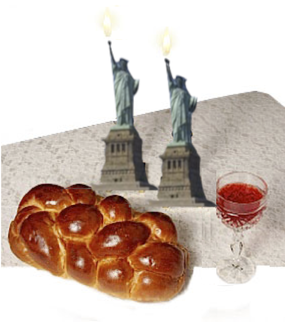| Being an American and being a Jew at the same time is easy, and also not so easy. My father's grandparents and my mother's parents came to this country because it promised a new beginning in a land where they would be free to be Jewish. They found that America was a place where they could make a living, get their children a good education and a better future, without giving up their identities as Jews. By the time of my generation and my parents' generation, being Jewish and being American at the same time was as easy as, well … apple pie and cheese blintzes. |
On Independence Day, almost all American Jews feel that they are celebrating their own holiday—as much as Chanukah or Rosh Hashanah are their holidays. For many American Jews, eating a hot dog off the grill on the Fourth of July actually is a more uncomplicated affirmation of identity than eating matzah on Passover.
And there is the rub. Has it become so easy for Jews to be American that we have a lost part of our sense of Jewish identity?
Today, on Independence Day, I will look forward to cheering at a parade with my children and watching the fireworks at night, just like my parents did with me not so long ago. There will be no need to explain the meaning of the holiday to the kids, to teach them the words to "The Star Spangled Banner," or to tell them why we light up the sky with colored lights on the anniversary of our nation's birth.
In a few months, I will be leading Rosh Hashanah worship at the congregation I serve, explaining to Jewish Americans why we eat apples and honey, coaxing them to sing along to "Avinu Malkeinu," and trying to help them understand the meaning of t'shuvah. There is no need to tell me which holiday is easier and feels more natural for them.
Part of that is okay with me. Judaism is hard and it is meant to be. There is no question that Rosh Hashanah makes more demands on a person's soul than does the Fourth of July. In my mind, Rosh Hashanah also offers greater rewards for those who devote themselves to it.
Part of what makes Jewish identity so captivating to me is that it always challenges me to understand myself more deeply, to test my limits a bit further, to enter more deeply into an encounter with life's ultimate meaning. I also have labored in the vineyards of being a committed American—I spent more than a decade as a professional on grassroots campaigns for the environment, for workers rights, and for good government. While I loved that work and found it meaningful, in hindsight, I see that I did not find the same level of personal challenge and spiritual fulfillment in that identity as I find in my identity as a Jew.
I will celebrate Independence Day today and I will love it. I will delight in the way my children cheer the parade and enjoy the glow of the pinwheels and Roman candles. I also will be glad, though, that theirs is a blended identity.
They, and I, are Jewish Americans. We love our 236-year-old country and we love our heritage in a Torah that is a bit older than that. We love waving the red, white and blue, and we love wrapping ourselves in a teaching that draws us closer to God and the Jewish people.
Who says you can't have both?
Other Posts on This Topic:
The Torah and the Constitution
How Does a Joyful Jew Respond to "Merry Christmas"?


 RSS Feed
RSS Feed
